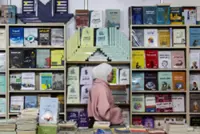The winner of the 2022 Booker Prize has said the attack on Salman Rushdie caused him to "self-censor" and discard work amid concerns for his own family.
Sri Lankan author Shehan Karunatilaka said that when writing "semi-political" work there was always consideration for whether it would "cost you more than you anticipated".





